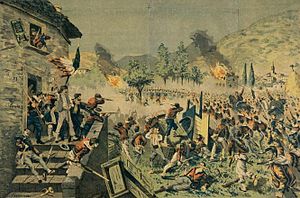Battle of Mentana
| Battle of Mentana | |||||||
|---|---|---|---|---|---|---|---|
| Part of the Unification of Italy | |||||||
 The Battle of Mentana. |
|||||||
|
|||||||
| Belligerents | |||||||
|
|
|
||||||
| Commanders and leaders | |||||||
|
|
|
||||||
| Strength | |||||||
| Uncertain: 4,000; 8,100; 10,000 | Uncertain: 5,000; 5,500; 22,000 | ||||||
| Casualties and losses | |||||||
| 1,100 killed and wounded, 800-1,000 prisoners | Papal, 144 killed and wounded; French, 38 | ||||||
The Battle of Mentana was fought on November 3, 1867 near the village of Mentana between French-Papal troops and the Italian volunteers led by Giuseppe Garibaldi, who were attempting to capture Rome, then the main centre of the peninsula still outside of the newly unified Kingdom of Italy. The battle ended in a victory by the French-Papal troops.
When the first Italian Parliament met in Turin, Victor Emmanuel II of Savoy was proclaimed King of Italy on March 17, 1861, and Rome was declared capital of Italy on March 27, 1861. However, the Italian government could not take its seat in Rome because Emperor Napoleon III maintained a French garrison there to prop up Pope Pius IX. This created an unstable political situation that led to much strife, both internal and external. In 1862 Giuseppe Garibaldi, the hero of the unification, organized an expedition from Sicily, under the slogan Roma o Morte (Rome or Death) that attempted to take Rome. However, after crossing the Straits of Messina, the expedition was stopped at Aspromonte (known as the Aspromonte incident of 1862) by Italian troops. Garibaldi was wounded, taken prisoner, but subsequently released. This act was forced on the Italian government by Napoleon III, who threatened military intervention if Garibaldi were not stopped.
On September 15, 1864, the September Convention was signed by the Italian government and Napoleon III. The Italian government agreed to protect the Papal States against external menaces and agreed to move the capital of Italy from Turin to Florence. The French garrison would be withdrawn from Rome within two years, during which time the Papal army would reorganize itself into a credible force. This unpopular agreement led to numerous riots (primarily in Turin which objected to its loss of status) and to renewed demands for the Italian government to take possession of its capital, Rome.
...
Wikipedia
